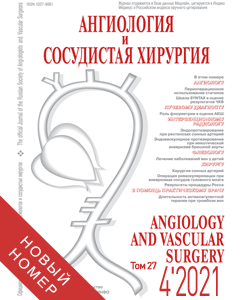Journal «Angiology and Vascular Surgery» •
2018 • VOLUME 24 • №4
Contemporary data on efficacy of anticoagulant therapy in recanalization of deep veins
Polyantsev A.A.1, Frolov D.V.1, Sukhanova G.A.2, Linchenko D.V.1, Litvinova T.A.1, Dyachkova Yu.A.1
1) Department for General Surgery and Urology, Volgograd State Medical University under the RF Ministry of Public Health, Volgograd,
2) Medical Research and Educational Centre, Moscow State University named after M.V. Lomonosov, Moscow, Russia
The article is a literature review containing a detailed description of anticoagulant therapy variants, their efficacy in recanalization of deep veins, as well as patients’ compliance to treatment.
Russian specialists have demonstrated that the processes of active re-organization of thrombotic masses, in some cases leading to complete clearing of the vessel’s lumen from a thrombus, may be observed at terms from 3 to 6 months, with a failure to occur within the above period reportedly followed by formation of irreversible cicatricial-sclerotic alterations in the veins. That is why adequate anticoagulant therapy should be initiated promptly in order to prevent the development of irreversible alterations and a decompensated form of chronic venous insufficiency. The process of recanalization of the venous segments involved appears to primarily depend on efficacy of anticoagulant therapy. Of special attention is a class of novel oral anticoagulants characterised by high clinical efficacy, prolonged and relatively safe administration, as well as thrombolytic activity.
The use of anticoagulant therapy, as well as adherence of patients to treatment make it possible to significantly decrease the frequency of a decompensated form of venous insufficiency and the need for reconstruction of the major veins.
KEY WORDS: venous thromboembolic complications, venous thrombosis, post-thrombotic disease, novel oral anticoagulants, low-molecular-weight heparins.
P. 191
ARCHIVES MAGAZINE
2021 (Vol.27)
2020 (Vol.26)
2019 (Vol.25)
2018 (Vol.24)
2017 (Vol.23)
2016 (Vol.22)
2015 (Vol.21)
2014 (Vol.20)
2013 (Vol.19)
2012 (Vol.18)
2011 (Vol.17)
2010 (Vol.16)
2009 (Vol.15)
2008 (Vol.14)
2007 (Vol.13)
2006 (Vol.12)
2005 (Vol.11)
2004 (Vol.10)
2001 (Vol.7)
2000 (Vol.6)
1999 (Vol.5)
1998 (Vol.4)
1997 (Vol.3)


